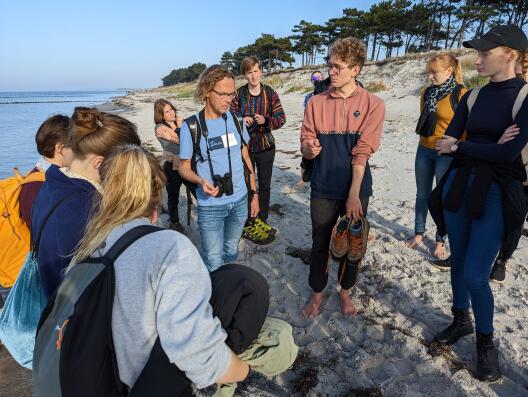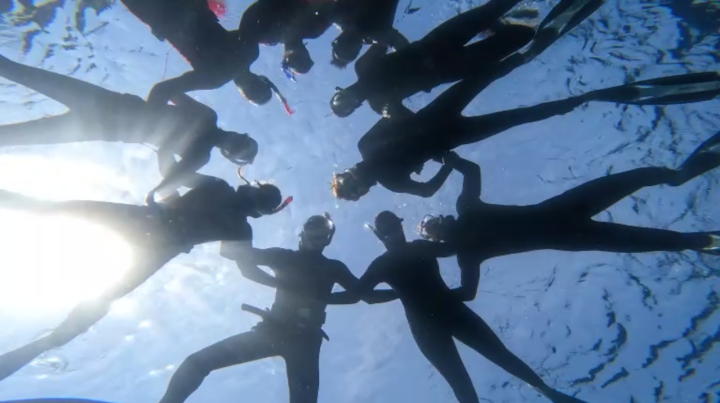Teaching
Photos


Ant under the microscope for morphological species identification and dissection© Robert Peuß 
Students catching sticklebacks at the "horse pond"© Robert Peuß 
© Robert Peuß 
Ejection of the fish trap to catch sticklebacks in the ‘horse pond’© Robert Peuß 
Contracaecum spec., a parasite, found in the intestine of a stickleback© Julia Kompa 
Students prepare the barbecue in the kitchen of the Hiddensee Biological Station.© Robert Peuß 
Dissection of sticklebacks in the course room of the Hiddensee Biological Station© Robert Peuß 
Nine spined stickleback, caugth at the "horse pond"© Marc Bauhus 
Course participants observe birds at the ‘horse pond’© Robert Peuß 
Boat trip to scout out possible sampling sites© Robert Peuß 
Bike ride to the beach© Robert Peuß 
© Robert Peuß 
Students dissect the caught sticklebacks and screen them for parasites in the course room at the Hiddensee Biological Station© Robert Peuß 
Sunset© Robert Peuß 
Sunset over the sea© Robert Peuß 
Sticklebacks caught at the harbour of Kloster (Hiddensee) in a bucket for transport to the biological station© Robert Peuß 
Student working in the lab at the IEB Münster© Robert Peuß 
Student netting for insects© Robert Peuß 
Student netting for insects© Robert Peuß
The Animal Evolutionary Ecology group offers a variety of courses for Bachelor and Master students.
In the Bachelor's programme we offer lectures on animal evolution, ecology and population genetics. Besides this, we also offer a course on the evolutionary ecology of animals in the 5th semester, which includes an excursion to Hiddensee, where we teach basics on ecological fieldwork and standard molecular techniques within the context of our current research.
In the Master's programme, we offer a module where we explore and study the Mediterranean fauna on Giglio, an island in the Mediterranean Sea off the coast of Italy. In addition to an accompanying seminar, we go snorkelling for 12 days and hiking to explore the local aquatic and terrestrial fauna. We further offer a module on Host-Parasite Coevolution, where we conduct experiments and provide theoretical knowledge to understand the arms rasces of hosts and parasites.
Photos


Leisure activities in the evening on the beach at Campese© Robert Peuß 
© Robert Peuß 
Polychaeta© Michael Jöst 
Group photo after hiking to the summit© Robert Peuß 
Campese beach, near the biological station© Robert Peuß 
Student dives up snail shell from the seabed© Maja Drakula 
Students on the beach with wetsuits borrowed from the Giglio Biological Station© Robert Peuß 
Student dives down to seagrass bed© Maja Drakula 
Afternoon together in the local ice cream parlour© David Boy 
Preparation for snorkelling on Campese beach© Robert Peuß 
Students in the water, last meeting before snorkelling© Robert Peuß 
Determination exercise in the morning at the Giglio Biological Station© David Boy 
Seminar in the course room of the Giglio Biological Station© Robert Peuß 
Start of the snorkelling trip© Robert Peuß 
Student dives above seagrass meadow© Maja Drakula 
Tour with rented scooters on the day off© David Boy 
© Robert Peuß 
Rock, covered with sea urchins© Annika Potthoff 
Jump into the sea at Torre© Robert Peuß 
© David Boy 
Hike to the beach of Caldane© Robert Peuß
Modules
Bachelor
Aufbaumodul Ökologie/Evolution/Biodiversität / Advanced module ecology/evolution/biodiversity (3. Semester)
- Evolution und Biodiversität der Tiere/Animal evolution and biodiversity (lecture & practical course)
- Evolutions- und Populationsgenetik/Evolutionary and Population Genetics (lecture)
Vertiefungsmodul/In depth module (5. Semester)
- Evolutionsökologie der Tiere/Animal evolutionary ecology (lecture, seminar, practical course & excursion)
Projektmodul und Bachelorarbeit/Project module and bachelor thesis (6. Semester)
- We are always happy to welcome dedicated students to work on their bachelor thesis in our group. If you are interested, please contact our group leader Joachim Kurtz.
- Click here to see currently offered project modules and bachelor thesis projects for 2025!
Master
Fortgeschrittenenmodule / Advanced modules
- Host-Parasite Coevolution (lecture, seminar & practical course)
- Mediterranean fauna (seminar & excursion)
Involved in
- Concepts and current topics in evolution (practical course & seminar)
- Experimental Ecology (lecture, seminar, practical course & excursion)
- The Growth of Evolutionary Thought (lecture & journal club)
Forschungsmodule / Research modules
- Ecological immunology and host-parasite coevolution (practical course & seminar)
In order to apply for research modules in our group, please contact our groupleader Joachim Kurtz.
Masterarbeit / Master thesis
- We are always happy to welcome dedicated students to work on their master thesis in our group. If you are interested, please contact our group leader Joachim Kurtz.

